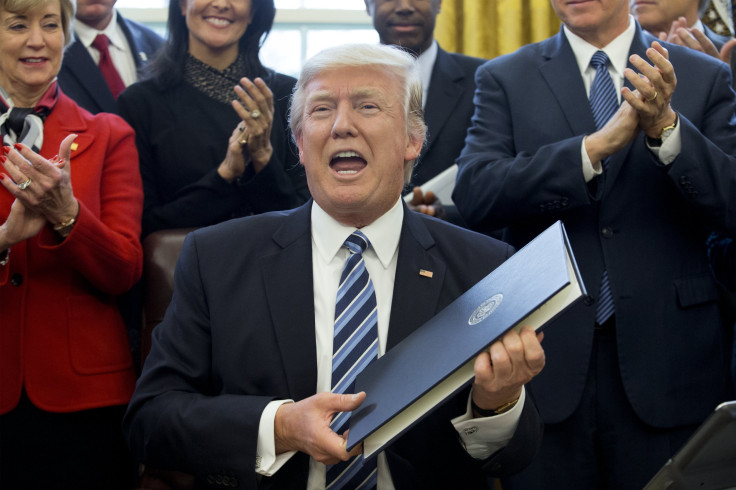Trump Health Care Plan Would Give Wealthy Republican Lawmakers A Tax Break

Republicans who support Donald Trump’s health care plan would be voting for what Democrats have slammed as a package of tax breaks for the wealthy. One of the new tax breaks in the GOP’s bill to repeal Obamacare could benefit Republican lawmakers and top officials in the Trump administration, an International Business Times review has found.
To help pay for coverage, the original Affordable Care Act in 2013 implemented a Net Investment Income Tax (NIIT), which slapped a 3.8 percent tax on investment income for the wealthiest Americans. The tax covers couples making over $250,000 a year and single people making over $200,000 a year, so not many people end up paying it: only 3.4 million out of 147 million tax returns filed in 2014 paid the tax, or 2.3 percent of all filers, according to the Citizens for Tax Justice.
The IBT review of tax records found that some of the top Republicans in the country have been among those 3.4 million taxpayers, meaning Republican lawmakers’ Obamacare repeal could end up delivering tax breaks worth thousands of dollars — and in some cases millions — to fellow public officials in their party.
Illinois Republican Gov. Bruce Rauner, who made millions in private equity before running for governor in 2014, paid $6.6 million in NIIT as part of $169 million he made from investments in 2015. Ohio Gov. John Kasich, a former Lehman Brothers executive, paid $5,799 in NIIT after making $143,061 from capital gains in 2014. While he hasn’t released his tax returns since 2013, Politico estimated Florida Gov. Rick Scott, who has called for an end to Obamacare taxes, could save between $250,000 to $500,000 in taxes if the NIIT is repealed.
More than half a dozen governors are now worth more than $100 million, including Tennessee Gov. Bill Haslam, a Republican, who is worth $2 billion, and West Virginia Democrat Jim Justice of West Virginia, who is worth $1.6 billion.
The repeal of the tax on investment income could also be a boon to Trump cabinet officials such as Secretary of Commerce Wilbur Ross, Secretary of State Rex Tillerson and Secretary of Education Betsy DeVos whose financial disclosure forms detail their vast investment holdings. If the GOP bill is enacted, the income those Trump officials earn from selling their investments would not be subjected to the levy.
Although the tax applied to very few filers, it generated $22 billion in revenue in 2014, according to Matthew Gardner, a senior fellow at the Institute for Taxation and Economic Policy. Congress’s Joint Committee on Taxation found that repealing the tax would lower revenue by $157.6 billion between 2017 and 2016.
“You can make a pretty good case for paying for health care in a progressive way,” Gardner told International Business Times. “I think there’s a lot of agreement that we ought to have progressive solutions that avoid hurting middle and lower income families. The Net Investment Income Tax avoids doing that.”
Public Officials’ Tax Returns Are Not Widely Available
While the federal government and some state governments do require public officials to file financial disclosure forms, those officials’ tax returns are not universally available, making it difficult to comprehensively document which lawmakers would benefit from the NIIT repeal.
Some gubernatorial candidates, like Rauner and Massachusetts Gov. Charlie Baker, voluntarily released tax returns in recent years, while members of Congress typically don’t. Presidential and vice presidential candidates usually do, though Donald Trump has refused to do so. Mike Pence did release his tax returns, which show he didn’t make any income from investments and didn’t make enough income to qualify for the NIIT.
It’s unclear how many members of Congress pay the tax, as the financial disclosure forms lawmakers are required by law to disclose give a range of values, not exact figures, for assets and income. They also don’t indicate tax payments.
But members of Congress are more likely than average Americans to have incomes that place them above the NIIT threshold. Some, like California Republican Rep. Darrell Issa, who is worth as much as $768 million, are wealthy compared to their colleagues. But almost all are wealthy compared to their constituents.
According to a 2015 analysis by the Center for Responsive Politics, the median net worth of a member of Congress was just over $1 million in 2013, up from less than $800,000 since 2008. Over nearly the same period, the median wealth of an American household actually decreased from $70,891 in 2009 to $56,335 in 2013.
Just because a couple has wealth greater than $1 million doesn’t mean they are pulling in over $250,000 a year and qualifying for the NIIT. But statistics do show that wealthy households are much more likely to get a large percentage of their income from investments. In 2011, the Congressional Budget Office found that the top 1 percent of income earners — who make more than $1.36 million — get 36 percent of their income from capital gains. That percentage falls to just 10 percent those in the 96th to 99th percentile of earners, and down to four percent for the 81st to 90th percentile.
How much financial self-interest might motivate individual congressional votes for the repeal legislation remains a matter of speculation. There is, however, some evidence suggesting that legislators might vote with their wallets in mind: A study released last year found that lawmakers who owned bank stocks were more likely to vote for the bank bailout after the 2008 financial crisis.
© Copyright IBTimes 2024. All rights reserved.






















